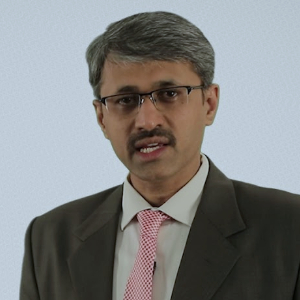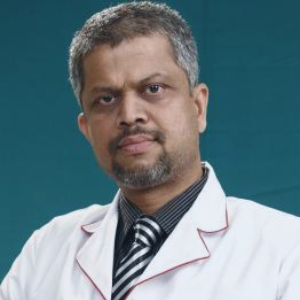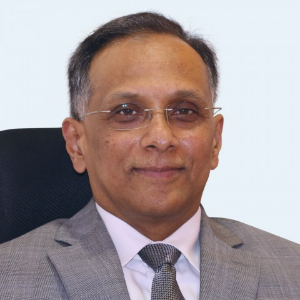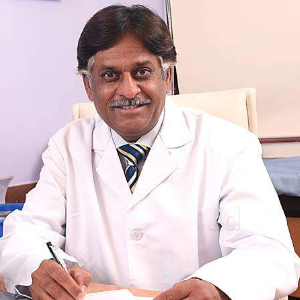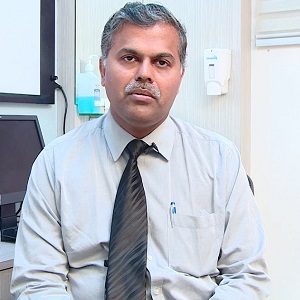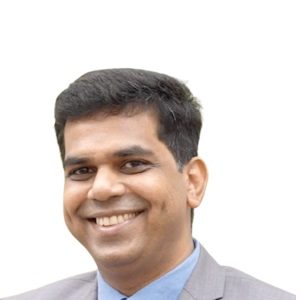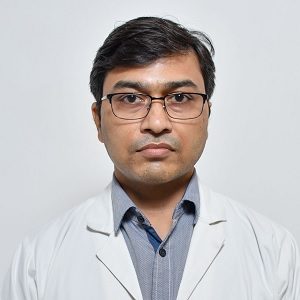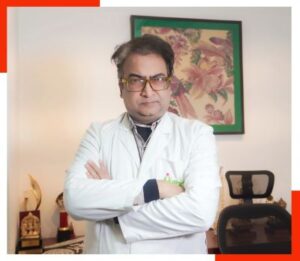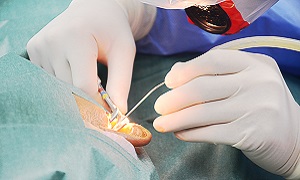Best Doctors in India for Acoustic Neuroma Treatment
- Neurosurgeon & Spine Surgeon, Bengaluru, India
- Over 15 years’ experience
Profile Highlights:
- Dr. Praveen K S is a highly qualified neurosurgeon with over a decade of experience in handling all kinds of neurological diseases and disorders.
- He specializes in Pediatric Neurosurgery, Neuro-Oncology, Endoscopic neurosurgery, Aneurysms, and Neuro- Trauma and has performed over 4000 neurosurgeries in his career.
- Neurosurgeon & Spine Surgeon, Mumbai, India
- Over 20 years’ experience
Profile Highlights:
- Dr. Rahul Modgi is a highly established neuro and spine surgeon in Mumbai specializing in all types of brain and spine surgeries.
- Dr. Rahul Modgi’s name has been recorded in the Limca Book of Records in 2014 when he removed the heaviest iron rod from the brain of a 17-year-old patient. He has also performed various other risky surgeries for which he has greatly appreciated.
- Neurosurgeon, Bengaluru, India
- Over 30 years’ experience
Profile Highlights:
- Dr. Rajakumar V Deshpande is a renowned Neurosurgeon in Bengaluru. He performed the first pedicle screw fixation surgery for a spine injury in Bangalore.
- Dr. D V Rajakumar specializes in endoscopic neurosurgeries and has performed some of the most complex brain and spine surgeries through the endoscopic approach. His other areas of interest include minimally invasive neuro surgeries, management of cerebrovascular diseases, and brain tumor surgeries.
- Neurosurgeon, Mumbai, India
- Over 20 years’ experience
Profile Highlights:
- Dr. Suresh Sankhla is an accomplished Neurosurgeon in Mumbai specializing in endoscopic neurosurgery and onco-neurosurgery.
- Dr. Sankhla acquired his training in neurosurgery under the guidance of the best trainers from well-known medical institutes and hospitals in Ireland, UK, USA as well as India.
- He has an equal interest in research and has published more than 100 articles, papers, and abstracts in renowned national and international peer-reviewed journals.
- Neurosurgeon, Chennai, India
- Over 25 years’ experience
Profile Highlights:
- Dr. M. Balamurugan is a well-known neurosurgeon in India with 25 years of experience.
- Dr. Balamurugan assists in managing Carotid Body Tumor Embolization, Brain Arteriovenous Fistula Embolization, Nerve and Muscle Disorders, Spinal and Cerebral Tumor Embolization, etc.
- Dr. Balamurugan is a life member of various prestigious associations and institutions.
- He also authored research studies or papers and articles for several publications.
- Neurosurgeon, Chennai, India
- Over 22 years’ experience
Profile Highlights:
- Dr. Srinivasan Paramasivam is a well-known Neurosurgeon in India having an overall experience of 22 years.
- He is associated with Apollo Hospital, Chennai as a senior consultant – neurosurgeon following his assignments abroad.
- Dr. Paramasivam earned a fellowship in Endovascular Neurosurgery from New York. He has 17 years of specialized experience in Neuro Interventional Surgery, Cerebral Angioplasty, Brain Tumor Surgery, Surgical Clipping, etc.
- Neurosurgeon, Gurugram, India
- Over 25 years’ experience
Profile Highlights:
- Dr. Pawan Goyal is a renowned neurosurgeon in Gurugram with 25 years of experience.
- He gained expertise in endoscopic neurosurgery, minimally invasive spine and neurosurgery, all brain and spine tumors, head and spine injuries.
- Neurologist
- Over 20 years' of experience
Profile Highlights:
- Dr. Praveen Gupta is one of India’s top Neurologists, who is currently serving as the Principal Director & Unit Head of Neurology at Fortis Memorial Research Institute, Gurugram.
- Over the course of his 23-years career, Dr. Gupta has made a lasting impact on the field of neurological treatment.
- Among his many firsts, Dr. Gupta founded the first-ever stroke centre in Gurugram and pioneered the use of single-arm mechanical thrombolysis, which completely changed the way strokes are treated in the area.
- He also pioneered Deep Brain Stimulation (DBS) treatments for Epilepsy and Parkinson’s disease, raising the bar for neurological care.
- Gupta has been the founder of two prestigious neurology departments at prestigious corporate hospitals, Artemis and Paras. He has consistently managed the highest possible number of both inpatient and outpatient cases, with an exceptional daily volume of 50 and 100 patients respectively.
- As a highly sought-after speaker, Dr. Gupta often contributes to the progress of neurological treatments and services by sharing his knowledge at national and international conferences.
Best Hospitals in India for Acoustic Neuroma Treatment
W Pratiksha Hospital, Gurgaon
- City: Gurugram, India
Hospital Highlights:
- W Pratiksha Hospital, Gurugram, is one of the best hospitals in the NCR region. It is also a top hospital in India for IVF. Since its inception, the hospital has performed over 5500 successful IVFs. The hospital also specializes in gynecology.
- With over 20 years of experience in providing quality healthcare, the hospital is known as one of the most trusted and valued health providers in India.
- Equipped with world-class medical facilities and advanced technology, the hospital’s doctors and clinicians also have a track record of delivering excellent results. The hospital is also known for focusing on preventive well-being as much as on curative treatment.
- The hospital has earned the trust of its patients, by providing the best available treatments at affordable costs.
Narayana Superspeciality Hospital, Gurugram
- City: Gurugram, India
Hospital Highlights:
- Situated near DLF Cyber City, Gurugram, Narayana Superspecialty Hospital is one of the top medical facilities in the Delhi NCR region, catering to the needs of the people. Known for its commitment to quality medical care and patient service, the hospital is a state-of-the-art facility with planned and well-equipped sections, which includes a spacious OPD area as well as comfortable patient rooms.
- It is the closest super-specialty hospital from Indira Gandhi International Airport towards Gurugram, and also the nearest super specialty hospital from DLF Cyber City. It is also close to major residential areas in Gurugram.
- It is part of the renowned Narayana Health Group. Established in 2000, by Dr. Devi Shetty, a renowned cardiac surgeon, it has grown to be one fo India’s leading healthcare groups.
Sir Ganga Ram Hospital, New Delhi
- City: New Delhi, India
Hospital Highlights:
- Sir Ganga Ram Hospital, New Delhi is known to provide the latest medical procedures with the latest technology in all of its units.
- The hospital has a team of reputed doctors, nurses, and healthcare professionals that ensure that patients receive quality care at affordable costs.
- Staffed with a team of highly qualified doctors, dedicated nurses, and paramedical and non-medical staff, the hospital aims to lead in healthcare delivery, medical education, training, and research.
- As per the vision of the founder, the hospital also provides free treatment to the economically weaker sections of society.
- Sir Ganga Ram Hospital also provides training to young doctors under the Diplomate in National Board(DNB) program. The DNB program at the hospital was started in 1984 and it is known for currently running the maximum number of DNB specialties in the country. It also has the distinction of having the first bone bank in India.
CK Birla Hospital, Gurugram
- City: Gurugram, India
Hospital Highlights:
- The CK Birla Hospital in Gurugram is a NABH-accredited multi-specialty hospital.
- The hospital strives to increase the quality of healthcare by focusing on UK NHS nurse and midwife training requirements. Policies and practices derived from the National Institute for Health and Treatment Excellence (NICE) recommendations in the United Kingdom ensuring that a strong focus on safety, high-quality clinical care, and sanitation is maintained.
- The hospital’s cutting-edge technology and facilities allow for real-time communication and seamless collaboration among caregivers, ensuring accuracy and the best possible results. Those with foreign experience and accreditations make up part of the hospital’s team of clinicians.
KIMS Hospital, Hyderabad
- City: Hyderabad, India
Hospital Highlights:
- KIMS Hospital (a brand name of Krishna Institute of Medical Sciences) is one of the largest and best multi-speciality hospitals in Hyderabad. The hospital provides various treatments to an enormous number of patients.
- The hospital has a capacity of more than 3000 beds. KIMS Hospitals offers different healthcare services in more than 25 specialities and super specialities.
- The hospital is equipped with modern medical equipment and technology. It has robotic equipment to provide minimal invasive techniques for patients.
- The hospital is aimed at providing world-class healthcare facilities and services at an affordable cost for patients.
- The various specialities and departments of the hospital include neurosciences, gastroenterology & hepatology, robotic science, reproductive sciences, dental science, oncological sciences, organ transplantation, heart and lung transplantation and mother and child care.
Fortis Hospital, Shalimar Bagh
- City: New Delhi, India
Hospital Highlights:
- Fortis Hospital in Shalimar Bagh is a multi-super specialty hospital that strives to provide world-class patient care by leaving no stone unturned.
- Fortis, Shalimar Bagh, with 262 beds and a 7.34-acre footprint, provides the best level of medical care through its team of doctors, nurses, technicians, and management professionals.
Reliance Hospital, Mumbai
- City: Mumbai, India
Hospital Highlights:
- Reliance Hospital is one of the best super-specialty care hospitals in Navi Mumbai.
- The main purpose of this hospital is to become a trustworthy place for the best health and hope for society. The hospital is well connected to the suburbs of Mumbai and Navi Mumbai.
- The hospital has various specialty departments, viz., Accident & Emergency, Anesthesiology, Dental Services, Dermatology, Diabetology, Dietetics Nutrition, Endocrinology, ENT, Gastroenterology, General Surgery, Gynaecology And Obstetrics, Hepato Pancreato Biliary Surgery, Infectious Disease, Internal Medicine, Interventional Radiology, Laboratory Medicine, Minimal Access Laparoscopic Surgery, Nephrology, Neurosciences, Opthalmology, Orthopaedics, Paediatrics, Pain Management Palliative Care, Physical Medicine Rehabilitation, Plastic And Reconstructive Surgery, Psychiatry, Pulmonary Medicine, Radiology, Rheumatology, Transplant, Urology Andrology, Vascular Surgery
Lilavati Hospital & Research Centre, Mumbai
- City: Mumbai, India
Hospital Highlights:
- Lilavati Hospital & Research Centre is India’s premier multi-speciality tertiary care hospital and has been recognised as a global medical excellence centre.
- Lilavati Hospital & Research Centre has built an unrivalled level of trust with its patients over the years, thanks to a solid foundation that comprises cutting-edge facilities, the best medical competence, research, education, and charity endeavours.
- The hospital is quite proud of the fact that it now serves patients from all kinds of backgrounds, not just from the United States but from all around the world.
- The hospital has a total of 323 beds, one of the largest Intensive Care Units (ICUs), 12 Operation Theatres with modern amenities, over 300 consultants, and almost 1,800 personnel.
MGM Healthcare, Chennai
- City: Chennai, India
Hospital Highlights:
- Located in Chennai, India, MGM Healthcare is a top multispecialty hospital that provides all medical services under one roof.
- Since its founding in 2019, MGM Healthcare has quickly become a leading national referral centre, creating several innovative flagship initiatives.
- MGM Healthcare combines next-generation medical and digital technologies to provide better patient results.
- With 12 centres of excellence, more than 400 inpatient beds, 100 intensive care unit beds, and 24/7 emergency care, MGM Healthcare leaves no chance in redefining the patient experience in Chennai.
- MGM Healthcare boasts 250+ expert doctors across 30+ departments, including Cardiology, Pulmonology, Neurology, Obstetrics & Gynaecology, and more.
- They house 12 specialized Centres of Excellence, including Neurosciences, Orthopaedics, and Multi-Organ Transplantation.
- Their team of doctors, nurses, and paramedics works together to give every patient individualized treatment.
ACOUSTIC NEUROMA
Acoustic neuroma is a noncancerous growth which can develop on the eighth cranial nerve. Also termed as the vestibulocochlear nerve, it is known to connect the inner ear with the brain, and it consists of two different parts. While one part is responsible for the transmission of sound, the other part helps to send balance information from the inner ear to the brain.
Acoustic neuromas, which may also be termed vestibular schwannomas, or neurilemmomas, generally grow slowly over a period of years. They may not actually invade the brain, but they can push on it as they continue to grow. Larger tumors can press on the nearby cranial nerves that control the muscle of facial expression as well as sensation. If the tumors get large enough to press on the brain stem or the cerebellum, then they can be quite deadly.
Symptoms
Signs and symptoms of acoustic neuroma are mostly subtle, and it can take several years to fully develop. They generally arise from the tumor’s effects on the hearing and balance nerves. Pressure caused by the tumor on the adjacent nerves that control the facial muscles and sensation, brain structures, or nearby blood structures can also cause problems.
As the tumor continues to grow, it might be more likely to cause more noticeable or severe signs and symptoms. Some of the common signs and symptoms of an acoustic neuroma can include the following:
- Hearing loss, which is usually gradual. However, in some cases, it may be sudden. It might also occur on only one side or more pronounced on one side.
- Ringing in the affected ear which is also termed as tinnitus
- Facial numbness and very rarely, weakness or loss of muscle movement
- Unsteadiness, or loss of balance
- Dizziness, which can also be termed as vertigo
In some rare cases, an acoustic neuroma can even grow large enough and compress the brainstem, which may become life-threatening.
If you notice significant hearing loss in one ear, ringing in your ear, or trouble with your balance, then you should consider seeing your doctor soon.
Early diagnosis of an acoustic neuroma might help in keeping the tumor from growing large enough to cause any serious consequences, such as total hearing loss or a life-threatening buildup of fluid within the skull.
Causes
Two types of acoustic neuroma exist: a sporadic form and a form associated with a syndrome which is known as neurofibromatosis type II (NF2). NF2 is an inherited disorder that is characterized by the growth of noncancerous tumors in one’s nervous system. Acoustic neuromas are also known to be the most common of these tumors and they generally occur in both ears by the age of 30.
NF2 is a rare disorder, and it accounts for only around 5 percent of acoustic neuromas. This means the vast majority of the cases are the sporadic form. Doctors are however uncertain what exactly leads to this sporadic form. One of the known risk factors for this condition is exposure to high doses of radiation, especially to one’s head or neck.
Diagnosis
In the early stages, it is generally difficult to diagnose acoustic neuroma, since signs and symptoms might be subtle and can develop over time gradually. Some of the common symptoms include hearing loss, which is associated with several middle and inner ear problems.
After you ask questions about your symptoms, your doctor will be conducting an ear exam. Your doctor might order the following tests.
Hearing test (audiometry)
Imaging
Treatment
There are three main courses of treatment which are used for acoustic neuroma:
- Observation
- Surgery
- Radiation therapy
Observation
Surgery
Surgery for acoustic neuromas involves removing the entire or part of the tumor.
Three main surgical approaches exist, for the removal of an acoustic neuroma:
Translabyrinthine
Translabyrinthine involves making an incision behind the ear and then removing the bone behind the ear along with some of the middle ear. This procedure is generally used for tumors which are larger than 3 centimeters. The upside of this approach is that it can allow the surgeon to see an important cranial nerve or the facial nerve quite clearly before he/she removes the tumor. The downside to this technique is that it causes permanent hearing loss.
Retrosigmoid/sub-occipital
Retrosigmoid/sub-occipital method involves exposing the back of the tumor by opening the skull near the back of one’s head. This approach can be used in order to remove tumors of any size and it also offers the possibility of preserving one’s hearing ability.
Middle fossa
Radiation therapy
Radiation therapy might be recommended in certain cases for acoustic neuromas. Due to state-of-the-art delivery techniques, it is possible to send high doses of radiation to the tumor while at the same time, limiting exposure and damage to any surrounding tissue.
The tumor’s growth might slow or stop or it might even shrink, however, the radiation doesn’t remove the tumor completely.
Complications
An acoustic neuroma can lead to a variety of permanent complications, which can include the following:
- Hearing loss
- Ringing in the ear
- Facial numbness and/.or weakness
- Difficulties with balance
Large tumors may press on your brainstem, which can prevent the normal flow of fluid between the brain and the spinal cord. In this case, fluid may build up in your head, which can increase the pressure inside the skull.

